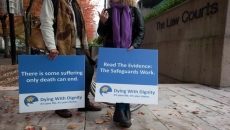New data from Statistics Canada shows multiple-property owners held between 29 and 41 per cent of the housing stock in Ontario, British Columbia, Nova Scotia, and New Brunswick in 2019 and 2020.
The data from the Canadian Housing Statistics Program, which includes both residential and recreational holdings, reveals multiple-property ownership accounted for 41 per cent of Nova Scotia's housing stock, 39 per cent of New Brunswick's, 31 per cent of Ontario's and 29 per cent of British Columbia's.
Multiple-property owners totalled 22 per cent of all owners in Nova Scotia, 20 per cent in New Brunswick, 16 per cent in Ontario, and 15 per cent in British Columbia.
Businesses, government and other entities owned about 7.6 per cent of Ontario's property stock and 10 per cent of British Columbia's.
The numbers offer a pre-pandemic window into some of the country's most heated markets and quantify some of the influence investors have on housing supplies, but are not a complete picture because many provinces and territories were not studied, the data does not break down how many properties are being rented out or used as a cottage and the figures don't account for the health crisis.
The data comes after the Bank of Canada found in February 2021 that investors made up 20 per cent of the country's home purchases.
Anne Hermary believes few buyers have been deterred from owning multiple properties by the pandemic and soaring real estate prices. If anything, the health crisis has made buyers feel that real estate is a more sound investment, said the Vancouver real estate adviser with Royal LePage Westside.
"In the last couple of years, we have seen millennials deciding that real estate is one of the safest investments and they are taking money, not only to buy their first home, but from other investing sources to buy a second home," she said.
"I have clients that are retired or semi-retired who have a lot of equity in homes they have owned for 30 years, so they are pulling equity out of that property to buy another property as retirement income."
Over on the East Coast, Jacqui Rostek said her clients who are choosing to own multiple homes are typically wealthy and "not looking to get rich quick."
They see Nova Scotia's shrinking vacancy rates and steady need for rental homes as a way to pad their bank accounts, though many are realizing it will take longer to make back the money they spent on another home.
The demographic Rostek noted shifting toward multi-property ownership is in line with Statistics Canada's data, which shows that the top 10 per cent of owners in those provinces earn more than the bottom 50 per cent combined, with the top 10 per cent of owners in Ontario and British Columbia each earning yearly incomes above $125,000.
But for many, multi-home ownership remains a difficult feat, especially amid inflation and an environment with rising interest rates.
The national average home price climbed by more than 20 per cent since last year to hit a record $816,720 in February, the Canadian Real Estate Association said.
Rostek has seen many multi-property holders, especially those who are small-time, relinquish homes during the COVID-19 pandemic.
"A few people decided to reinvest their capital in other ways, like the stock market, businesses, other holdings, and it was a good time because your investment was worth more," said the broker with Platinum Group Halifax.
"I also definitely had a fair amount of people who said it was very hard to be a landlord. If you have a few bad experiences as a landlord, you lose money, a tenant damages things, you want out."
As a result, many are sticking to owning one home and are being joined by an influx of first-time buyers.
Statistics Canada's data shows between 2018 and 2019 the number of first-time homebuyers increased by 17 per cent in New Brunswick, 9 per cent in Nova Scotia and 6 per cent in British Columbia.
Hermary believes the increase is being driven by people earning more and banking on there being stability in real estate investments.
"People are starting to realize they should have confidence in real estate," she said.
"We are going to start seeing millennials and people up to the 35 or 40 start looking at investment properties as something they can do to build equity."
The data's release comes less than a week after the federal government announced a slew of housing measures, including the end of blind bidding, a two-year ban on foreign buyers and a first-time buyers savings account, meant to make homes more affordable and temporarily less accessible for non-residents.






